Over 30 years of anarchist writing from Ireland listed under hundreds of topics
Water charge
Jobstown Not Guilty verdict exposes Garda, Labour and class rule in Ireland
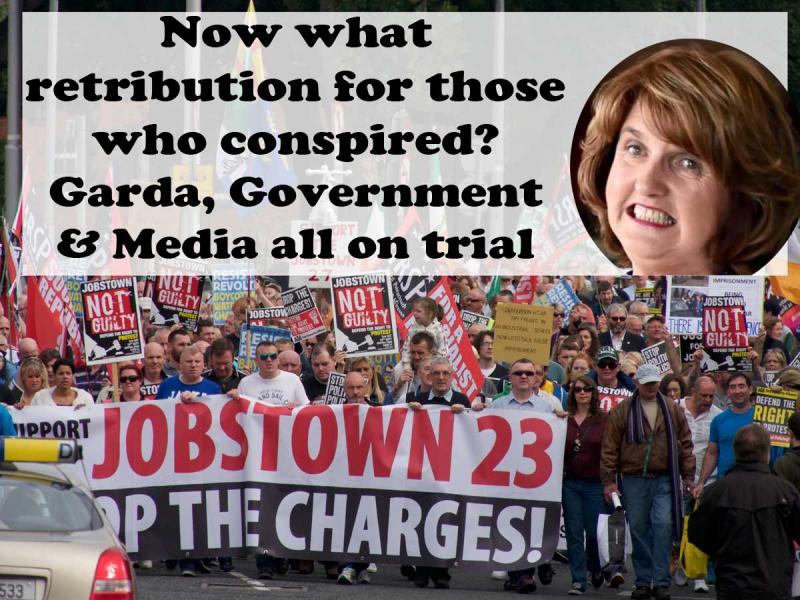 THE JOBSTOWN SIX have been found NOT GUILTY - a disastrous outcome for the Labour party and Garda in what has been the biggest political show trial for some decades. It is impossible to have followed the details of the arrests and trial and walk away with the impression that the Garda were not acting on government instructions, even if just on the basis of the ‘nod and a wink’. The verdict may well catch anyone relying on the mainstream media as a surprise because right across that media the reporting of the trial was highly selective, reflecting the interests of those who own and control it.
THE JOBSTOWN SIX have been found NOT GUILTY - a disastrous outcome for the Labour party and Garda in what has been the biggest political show trial for some decades. It is impossible to have followed the details of the arrests and trial and walk away with the impression that the Garda were not acting on government instructions, even if just on the basis of the ‘nod and a wink’. The verdict may well catch anyone relying on the mainstream media as a surprise because right across that media the reporting of the trial was highly selective, reflecting the interests of those who own and control it.
*** A summary for anyone following this from outside Ireland, six men were on trial accused of falsely imprisoning the then Tanáiste and Labour TD, Joan Burton, and her colleague in Jobstown on 15 November 2014. The charge of false imprisonment carries a maximum sentence of life imprisonment. All six men claimed that they were exercising their right to protest, and that the protest was peaceful. Following a nine week trial, the six have been found not guilty. ***
From apathy to rebellion: the water war in Ireland.
What is 'Self-Organisation'? A Basic Introduction
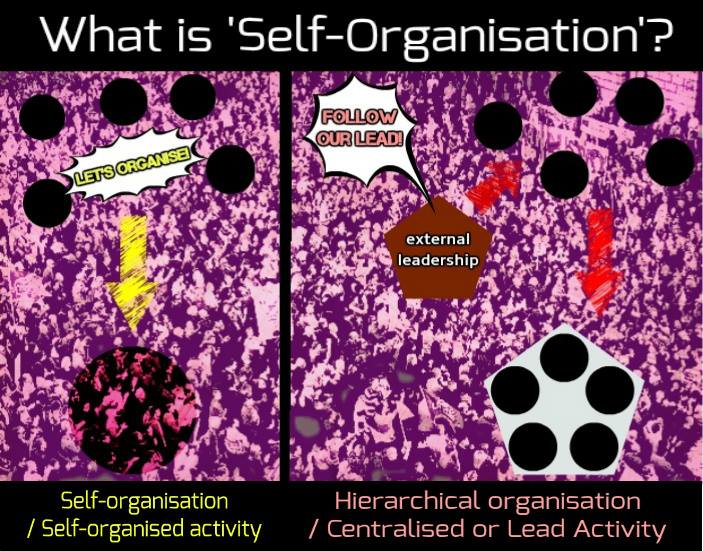 What is 'self-organisation'?
What is 'self-organisation'?
Listen to anarchists for long enough, and you'll hear us praising the 'self-organisation' of various movements or groups and insisting that political activity needs to be more 'self-organised'. But what does this mean? Why is this important?
It can be an odd-sounding term, but basically 'self-organisation' is doing stuff without relying on or waiting for external leadership or a central authority. A 'self-organised' movement doesn't wait for parties, unions, or whatever leader, to give it orders. A 'self-organised' group isn't controlled from the top-down. Self-organisation – like a related idea, 'self-management' – is at the core of anarchism. It makes us more effective, and gives us an opportunity to practice real democracy.
Solidarity Times leaflet for August 29th Water Charges march
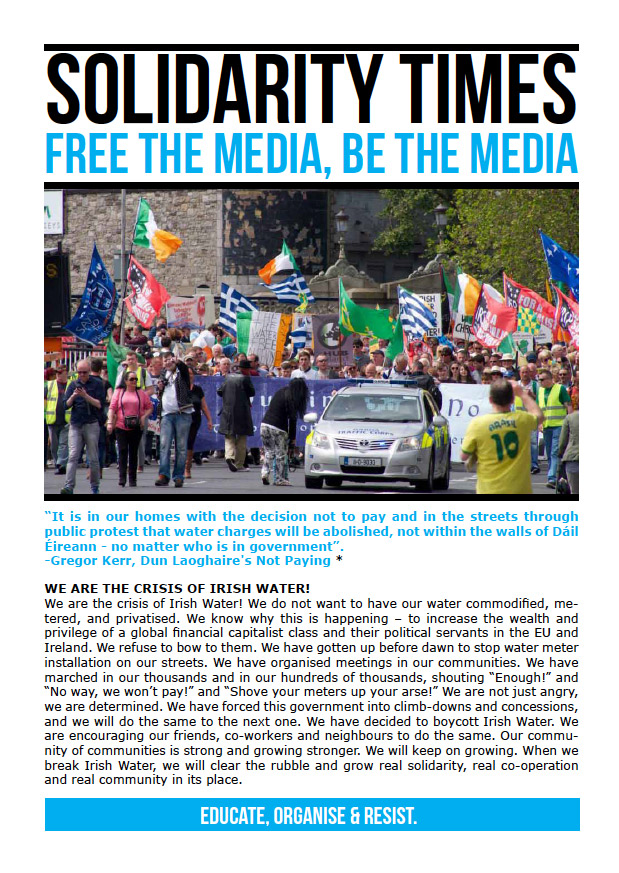 We are the crisis of Irish Water! We do not want to have our water commodified, metered, and privatised. We know why this is happening – to increase the wealth and privilege of a global financial capitalist class and their political servants in the EU and Ireland.
We are the crisis of Irish Water! We do not want to have our water commodified, metered, and privatised. We know why this is happening – to increase the wealth and privilege of a global financial capitalist class and their political servants in the EU and Ireland.
We refuse to bow to them. We have gotten up before dawn to stop water meter installation on our streets. We have organised meetings in our communities. We have marched in our thousands and in our hundreds of thousands, shouting “Enough!” and “No way, we won’t pay!” and “Shove your meters up your arse!” We are not just angry, we are determined.
We have forced this government into climb-downs and concessions, and we will do the same to the next one. We have decided to boycott Irish Water. We are encouraging our friends, co-workers and neighbours to do the same. Our community of communities is strong and growing stronger. We will keep on growing. When we break Irish Water, we will clear the rubble and grow real solidarity, real co-operation and real community in its place.
57% Non-Payment not looking good for Irish Water
Despite all the deadlines, threats and promises, government propaganda and hostile newspaper articles the non payment figure as of July 17th is a massive 57%. Hopefully this will encourage some of those who paid out of fear to join the boycott for the second bill.
Creating the Commons: on the meaning of Bolivia’s water wars
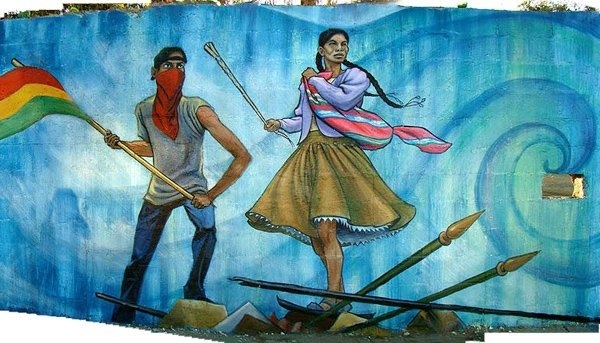
‘In the history of humankind every act of destruction meets its response, sooner or later, in an act of creation’ - Eduardo Galeano
In Bolivia, there have been remarkable experiences in urban peripheries, notably in Cochabamba, that reveal the capacity of grassroots associations to construct a free society based on solidarity and mutual aid. The background to the country’s Water War of April 2000 must be understood against preceding waves of struggle, particularly the huge marches for sovereignty and livelihoods of coca growers, Amazonian groups, and others that emerged with the implementation of the neoliberal model in 1985 [1]. Subsequent mine closures and rural migration occasioned huge increases in Bolivia’s urban centres, particularly in Cochabamba, the country’s third largest city. The state water company, Semapa, served only half of the city’s population. In the neglected southern peripheries, neighbourhood groups organised associations to bring water to their homes. Cooperatives, formed without state assistance, dug wells, built water mains, and even created drainage and sewers. In cases where wells could not be dug, the committees bought their own water tankers and organised daily deliveries. By 1990, some 140 urban water committees had formed in the south of Cochabamba, with between 300 and 1000 families in each one [1].
Thinking about Anarchism - Anarchism and the State
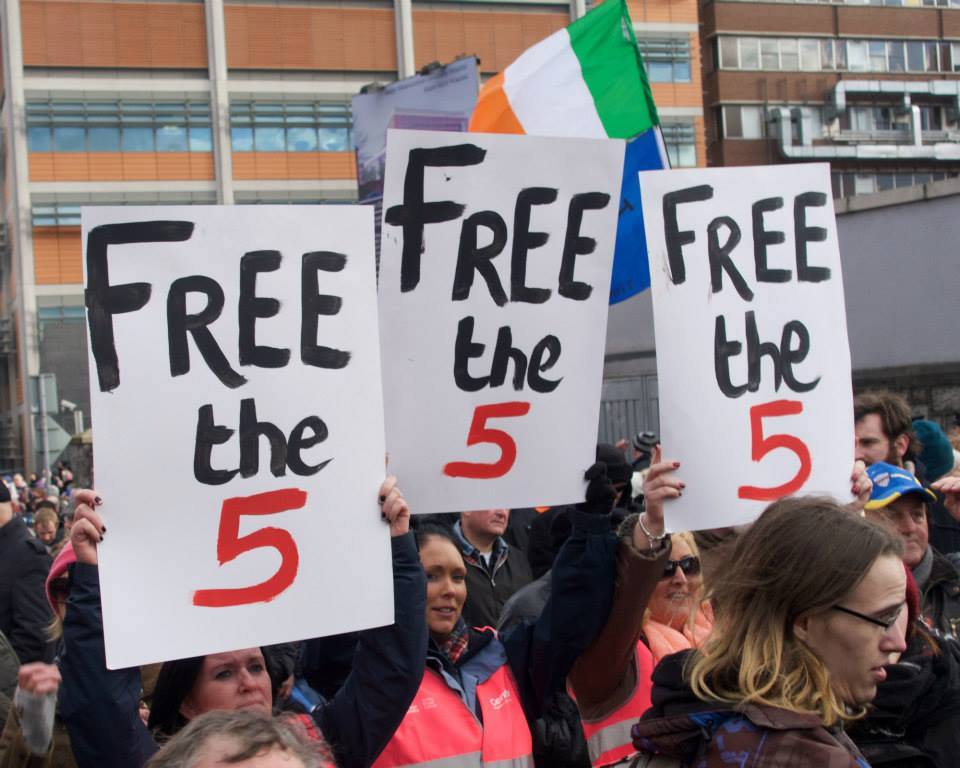 Ever wonder why the Gardaí show up in large numbers when you’re trying to stop water meters in your estate, but haven’t got the resources to come straight out when you think your neighbour’s house is being burgled? If so, you’re thinking about the state.
Ever wonder why the Gardaí show up in large numbers when you’re trying to stop water meters in your estate, but haven’t got the resources to come straight out when you think your neighbour’s house is being burgled? If so, you’re thinking about the state.
Misconceptions & Reality
The most common misconception about anarchism is that it is in favour of ‘chaos’ or some sort of world generally devoid of order and democratic institutions which would leave us at the mercy of predators within our society. Therefore it aims for the destruction of civilisation and democracy itself, which in this view are represented by the state – the guarantor of peace, freedom, and of course, roads.
The Water Revolt: Ireland 2015
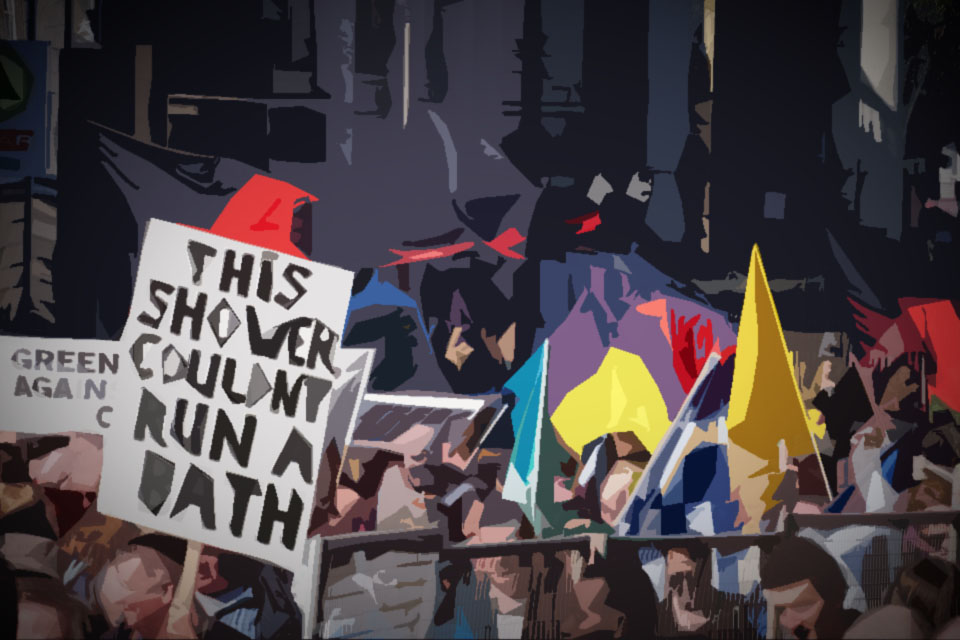 The campaign against the water charges is the most widespread and powerful grassroots movement in recent Irish history. With hundreds of local campaign groups, daily direct actions, and 4 national demonstrations on the order of 50,000-100,000, the cynical refrain that 'the Irish don't protest' has rapidly been replaced by a sense of ubiquitous rebellion. Irish Water is a depraved neoliberal world in effigy, embodying many of the worst problems of our society including the rule of international finance (and private greed in general) at the cost of the vast majority's well being, and the chronic disconnection of the populace from decision making. As such the movement has become a platform for opposition to austerity, the bank bailout, privatisation, the government, party politics, the EU, and more. Thousands of people have experienced a political (re-)awakening. But while it is possible that we will win this battle, and abolish Irish Water, this struggle represents a precious opportunity to make a grassroots offensive after so many years of being beaten down.
The campaign against the water charges is the most widespread and powerful grassroots movement in recent Irish history. With hundreds of local campaign groups, daily direct actions, and 4 national demonstrations on the order of 50,000-100,000, the cynical refrain that 'the Irish don't protest' has rapidly been replaced by a sense of ubiquitous rebellion. Irish Water is a depraved neoliberal world in effigy, embodying many of the worst problems of our society including the rule of international finance (and private greed in general) at the cost of the vast majority's well being, and the chronic disconnection of the populace from decision making. As such the movement has become a platform for opposition to austerity, the bank bailout, privatisation, the government, party politics, the EU, and more. Thousands of people have experienced a political (re-)awakening. But while it is possible that we will win this battle, and abolish Irish Water, this struggle represents a precious opportunity to make a grassroots offensive after so many years of being beaten down.
Direct Action: A Basic Introduction - Video & Text
An introductory video on what direct action is and isn't, providing illustrations from the campaign against the water charges.
Direct action is at the heart of the struggle against the water charges, from preventing meters being installed, to Meter Fairies removing them, to boycotting registration and the water bills in April. But what is direct action, and what is it not?
Water Charges: We've Got Them Surrounded. Imagine Winning. What Comes Next?
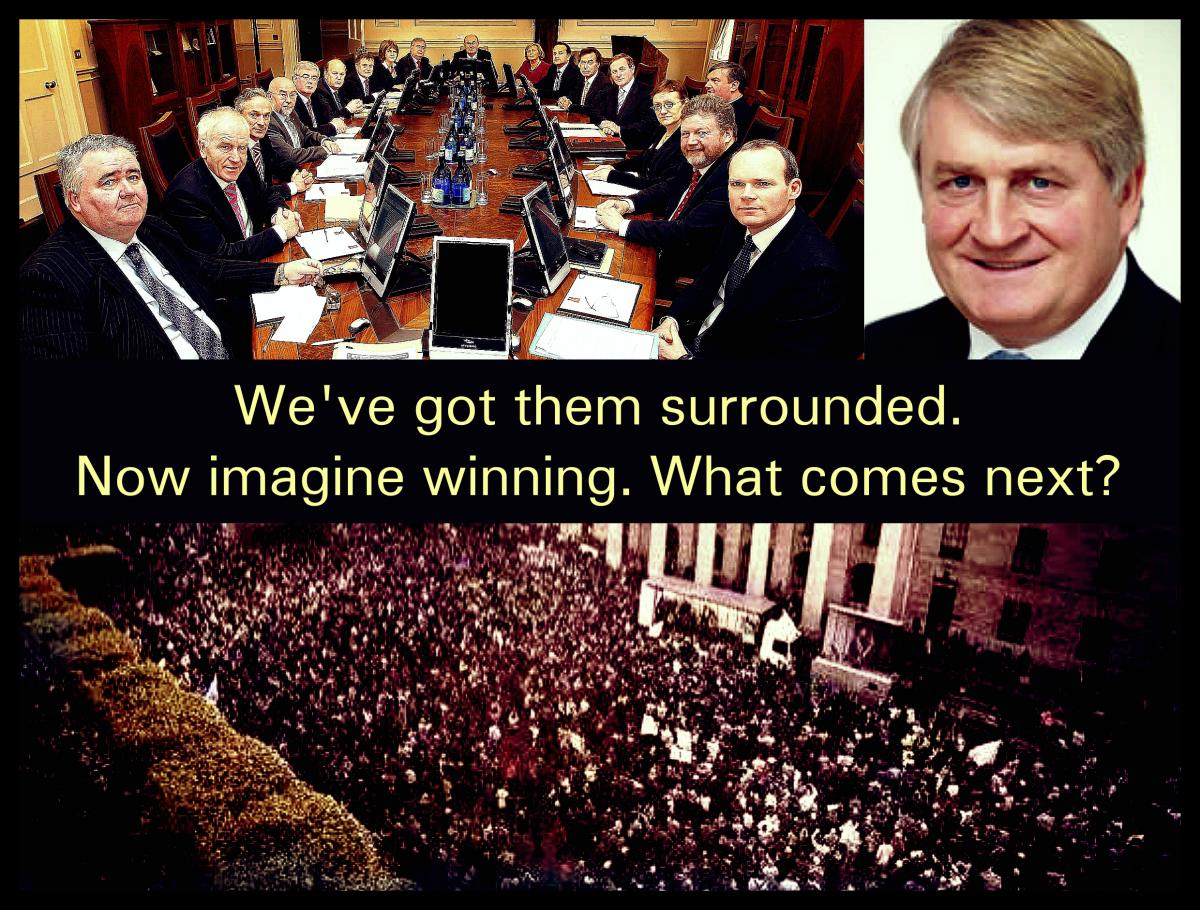 We can win this battle but we would be fools to settle for that. As someone said at the January 31st demonstration, 'we have them where we've wanted them for years'. Our opportunity is huge, with a great multitude politically awakened and eager to change society. So the question is presented: will we waste this opportunity to make a better world or will we seize it? What do we do once we win, and how should that affect what we do now?
We can win this battle but we would be fools to settle for that. As someone said at the January 31st demonstration, 'we have them where we've wanted them for years'. Our opportunity is huge, with a great multitude politically awakened and eager to change society. So the question is presented: will we waste this opportunity to make a better world or will we seize it? What do we do once we win, and how should that affect what we do now?
This raises lots of other broad questions we should all ask ourselves:
- Is voting in a new government enough?
- Should we keep the system the same, or try something new?
- How do we achieve that better world?
- What would a better system look like?

